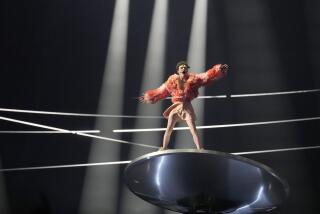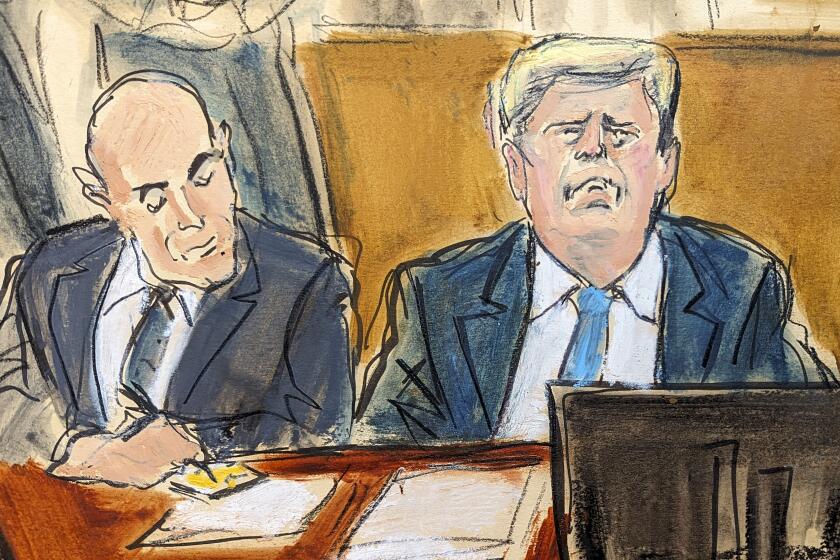Venezuela’s President Stymying Recall Attempt
Using partisan court appointments and pressuring electoral officials, Hugo Chavez has stalled what just a year ago seemed a runaway campaign to remove him as president.
With the clock counting down to an August deadline, even opponents acknowledge that it will be difficult, if not impossible, to stage a referendum on whether to recall Chavez, who has survived one coup attempt and two years of incessant dissent from a coalition of students, businesspeople and professionals.
“The doors are all closed right now,” Leopoldo Puchi of the opposition Movement for Socialism said of efforts to hold a recall election. “The situation is getting more tense by the day, and our fear is that it could become explosive.”
The Council on Hemispheric Affairs, a left-wing think tank generally supportive of Chavez for his ministrations to the poor, agrees. It has cautioned the Caracas government of the need to avert “fatal isolation” of opponents that could provoke violence.
When Chavez, 49, was elected as a populist in 1998, he set out to remake Venezuela. He oversaw the drafting of a new constitution, according rights to the impoverished minority long ignored in this oil-rich nation.
In a controversial drive to put his mark on a new social policy dubbed chavismo, he has launched campaigns against illiteracy and illness with the help of 12,000 Cuban volunteers dispatched by his ally, Fidel Castro, in compensation for discounted oil that Caracas supplies to the communist island nation.
But over time, populism has turned to authoritarianism, opponents charge, as Chavez put soldiers and police into key industrial and civil service posts, and stacked the courts with loyalists.
Opponents accuse him of destroying the middle class with foreign exchange controls that have staved off capital flight but also crippled the private business sector in this country that is the world’s fifth-largest oil exporter and a vital U.S. supplier.
As he moved closer to Castro, Chavez further alienated groups that had lost power, and they eventually retaliated with a short-lived coup two years ago.
Venezuela’s 24 million people appear polarized in opinion polls that show about one-third supporting the president, one-third demanding his ouster, and the remainder too bogged down by rising prices and slumping living standards to care.
The country suffered a nearly 11% contraction of gross domestic product last year, the consequence of a two-month national strike that devastated oil production, the nation’s cash cow.
Efforts to set a date for the vote on whether Chavez should be allowed to serve the rest of his term, which expires Aug. 19, 2006, have become mired in contradictory legal rulings about the validity of recall petition signatures.
Recall proponents delivered more than 3 million signatures to the National Elections Council, known as the CNE, on Dec. 19, well in excess of the 2.4 million needed to force a referendum. Three months later, the CNE, where three of the five members are considered Chavez allies, voted 3-2 that only 1.8 million of the signatures were valid, excluding 870,000 because canvassers had filled in part of the petition details so that supporters could simply sign their names.
After angry demonstrations in early March left 10 Chavez opponents dead, the CNE ordered a “correction period,” May 21-24, to allow those whose signatures were invalidated to come forward and sign again. The CNE relented on 100,000 of the disputed signatures last week, but said it needed at least two months to verify the confirmations and organize the recall vote if enough of the names were deemed valid.
That pushes the recall dangerously close to what is in effect an Aug. 19 deadline. The constitution specifies that if a president leaves office within two years of the end of his term, the vice president becomes head of state, thus sparing the nation from having to hold new elections. Vice President Jose Vicente Rangel, a close Chavez ally, would be expected to continue with the controversial policies if he were to become head of state, in effect nullifying opponents’ hopes of replacing Chavez.
Recall proponents appealed to the Supreme Court after the signatures fiasco, prompting one three-justice panel to rule this month that the issue was contrived and that a date for the recall should be set for late May. Another chamber composed of justices recently appointed by Chavez overruled that judgment, sending the issue to the full 20-member high court for resolution. Split evenly between Chavez supporters and detractors, the court isn’t obliged to issue a decision for two months.
Gerardo Blyde of the Justice First group accuses the president of manipulating the CNE and Supreme Court with appointments driven entirely by political objectives.
“We no longer have democratic institutions in our country. They have been corrupted so that the rules can be changed to the president’s liking,” said Blyde, a deputy in the National Assembly.
Unlike most of his colleagues in the opposition, though, Blyde believes that the recall effort should continue even if the vote cannot be held by Aug. 19.
“Even if it came only in September, it would discredit chavismo as an ideology and would probably provoke institutional crises,” said Blyde, referring to the leadership style Chavez has modeled on Castro’s signature fidelismo.
Others fear that Chavez is pushing his opponents to extremes by thwarting the recall.
“Justice delayed is justice denied. Venezuela is a country with a history of violence and, although we are not yet Beirut or Haiti, there is a danger of this denied justice spilling into the streets,” said Jesus Torrealba, a senior figure in the Democratic Coordinator alliance who has been negotiating with the CNE to clear obstacles to the recall.
“Eighty percent of the country agrees that only a referendum will resolve the standoff,” he added, citing opinion polls. “Even supporters of Hugo Chavez say it should go ahead, that they are confident they have a majority.”
Chavez backers such as Rangel and CNE chief Jorge Rodriguez were predicting months before the signature invalidations that the president would never have to face a recall referendum. They contend that their campaigns to combat poverty in the slums and the countryside are beginning to bear fruit and that the long-ignored poor will vote to retain Chavez even if there is a recall.
Opponents see the electoral maneuvering as stalling for time, but they have yet to concede defeat despite the approaching deadline.
“Chavez wants to avoid an accounting, but he can’t avoid it forever,” said Jhonny Sanabria, 26, a Caracas student. “The majority of the people don’t want him anymore.”
More to Read
Start your day right
Sign up for Essential California for news, features and recommendations from the L.A. Times and beyond in your inbox six days a week.
You may occasionally receive promotional content from the Los Angeles Times.







